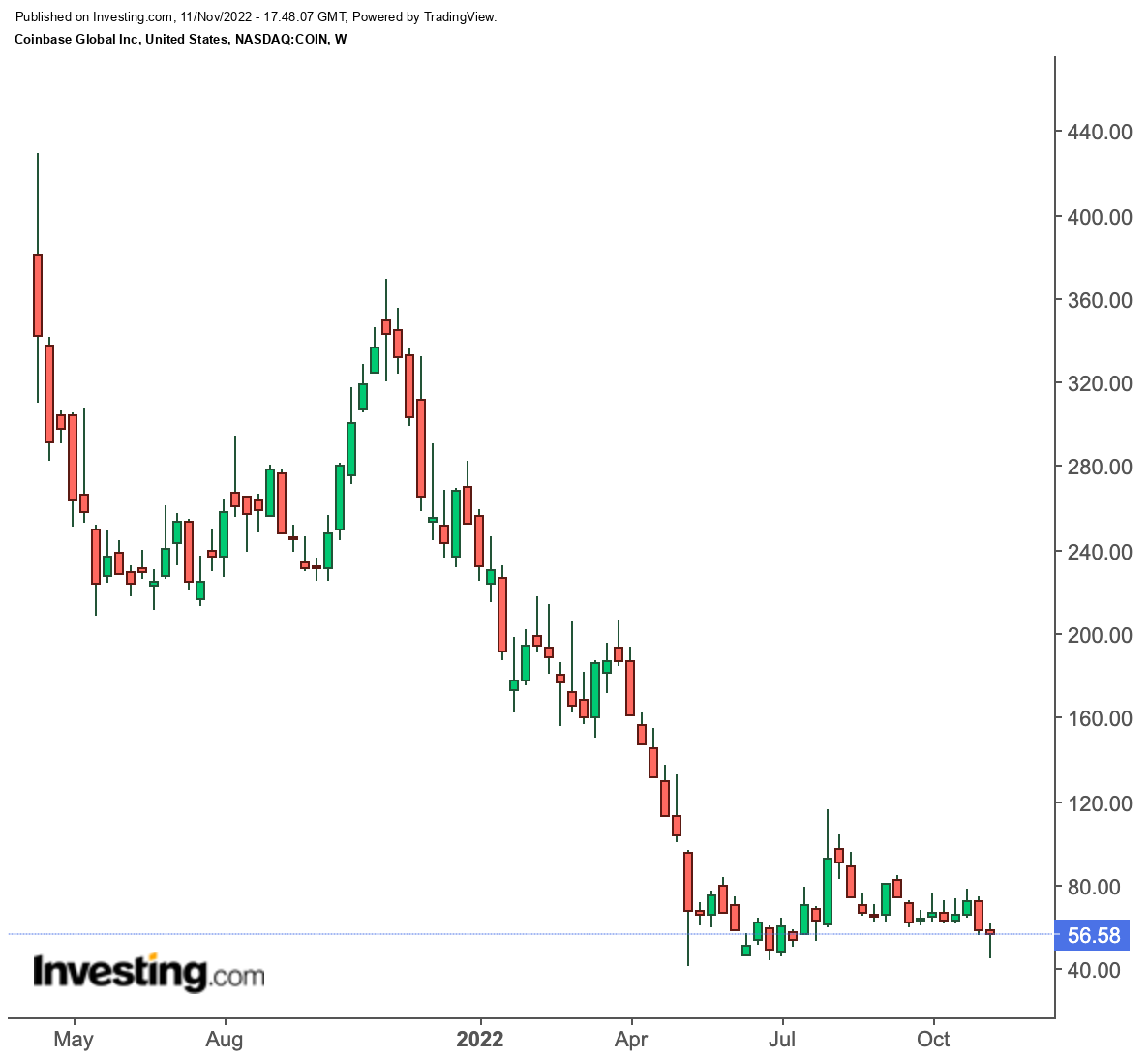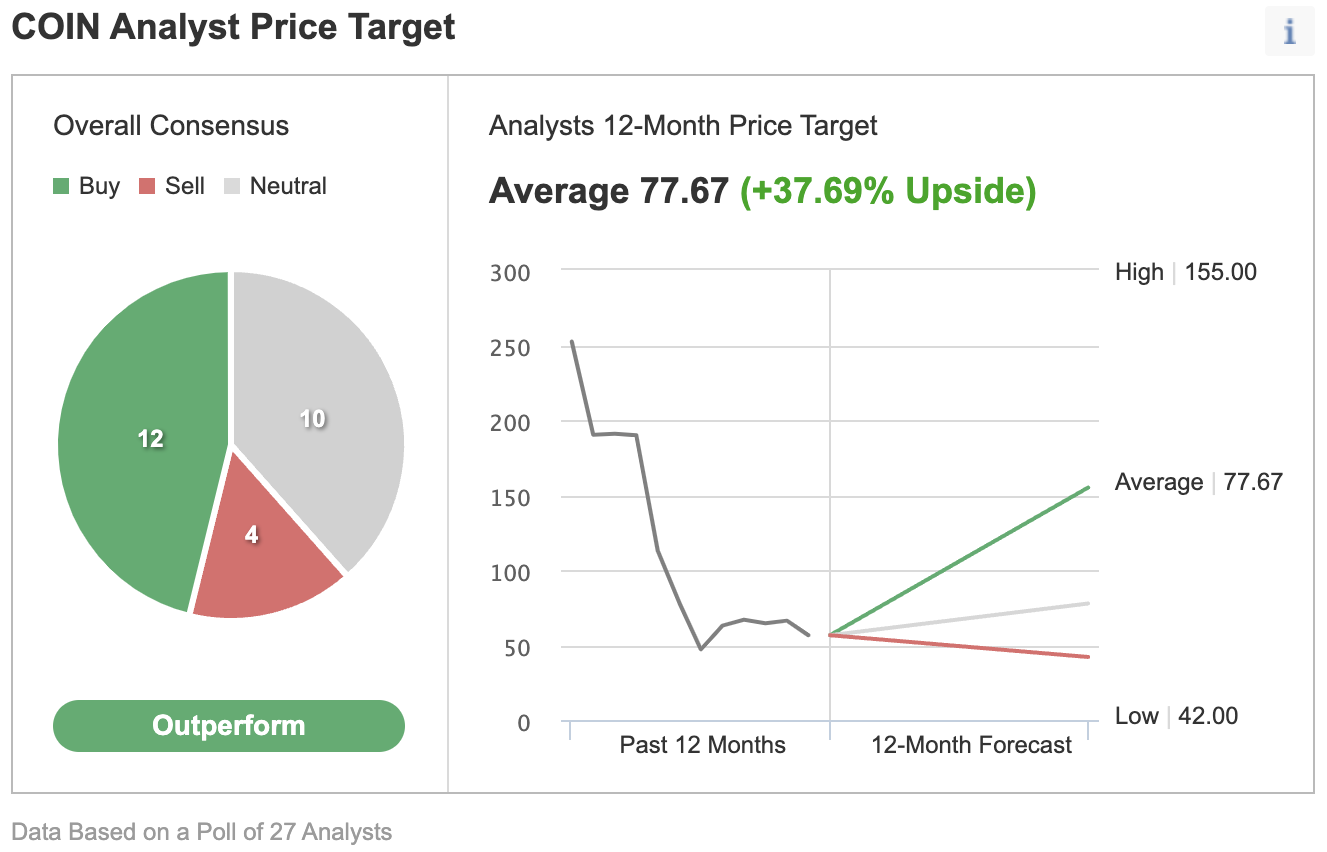- The speedy collapse of FTX shows that liquidity in crypto exchanges can dry up quickly
- Coinbase’s Chief Executive Officer has assured investors that the liquidity crunch that prompted the FTX meltdown wouldn’t happen at his company
- COIN could benefit from the increased trading activity as a result of the panicked selling, but over the long run, it means lower trading volumes and less revenue
The crypto world is in the midst of a harsh winter. And if that by itself wasn’t enough, FTX, one of the industry’s most prominent exchanges, is on the brink of collapse due to a liquidity crisis.
The ongoing turmoil at the global exchange, often considered a survivor of a broad market crash this year, has further shaken investors’ confidence in the future of the crypto industry.
In the latest development, FTX filed for U.S. bankruptcy protection on Friday. In a statement, the company said Chief Executive Sam Bankman-Fried resigned from his position but would remain to assist with an orderly transition as the company begins a process to review and monetize assets for stakeholders.
Investors, who have accounts with FTX global unit, could not withdraw their funds this week as the Bermuda-based exchange struggled to fill a financial hole of up to $8 billion.
This unfolding saga at FTX, the latest after multiple bankruptcies of similar nature over the past year, has clouded the outlook of more stable players in the industry, raising questions about who is next.
Coinbase Global (NASDAQ:COIN), the largest cryptocurrency exchange in the U.S. and the second-largest in the world, has lost more than 80% of its value since hitting a record high in November amid a widespread sell-off in crypto coins and other speculative assets. COIN traded on Friday at around $56 a share.

Investors now wonder if Coinbase, the first major cryptocurrency-focused company to go public, still has market appeal.
Coinbase Chief Executive Officer Brian Armstrong has assured investors that the liquidity crunch that prompted FTX collapse wouldn’t happen at his company because it doesn’t engage in “risky behaviors." In a Bloomberg Television interview this week, he said:
“We’re not investing customer funds. We’re not doing market making or engaged in any kind of complex arrangement with other parties that we own.”
Even if this is true, it’ll be naive to think that COIN will emerge unscathed from this confidence crisis. While the company was not directly involved in the failed FTX, the whole crypto market could be impacted negatively by increased uneasiness among investors.
In the near term, COIN could benefit from the increased trading activity as a result of the panicked selling, but over the long run, it means lower volume as liquidity dries up further in the crypto market. Even before the FTX crisis, Coinbase was getting hurt from macro headwinds and lower volumes.
In the third quarter, Coinbase’s trading volume fell by 51% to $159 billion from $327 billion a year ago. Transaction fees are roughly four-fifths of the company’s revenue. Monthly transacting users dropped to 8.5 million, down from 9 million in the prior quarter.
Despite this bleak near-term outlook, Wall Street analysts remain divided over COIN’s investment appeal. In an Investing.com poll of 27 analysts covering the stock, 12 have a buy rating, ten are neutral, and four analysts are recommending selling. Their consensus 12-month price target is $77.67, implying a 37% upside potential.

Source: Investing.com
In a note today, Piper Sandler reiterated Coinbase as overweight, saying the company is still well positioned for the long term. Its note says:
“COIN is strategically well positioned, and a solid balance sheet should help them weather a prolonged ‘crypto winter.’”
Bottom Line
The FTX fiasco is a net negative for all crypto assets, including COIN. The speedy collapse of FTX shows that liquidity in crypto exchanges can dry up quickly, exposing even the most trusted names in the industry.
Despite having a solid industry position, COIN is likely to see a long bearish spell, leaving little incentive for investors to buy its stock.
Disclosure: At the time of writing, the author did not own COIN shares. The views expressed in this article are solely the author’s opinion and should not be taken as investment advice.
Which stock should you buy in your very next trade?
AI computing powers are changing the stock market. Investing.com's ProPicks AI includes 6 winning stock portfolios chosen by our advanced AI. In 2024 alone, ProPicks AI identified 2 stocks that surged over 150%, 4 additional stocks that leaped over 30%, and 3 more that climbed over 25%. Which stock will be the next to soar?
Unlock ProPicks AI

